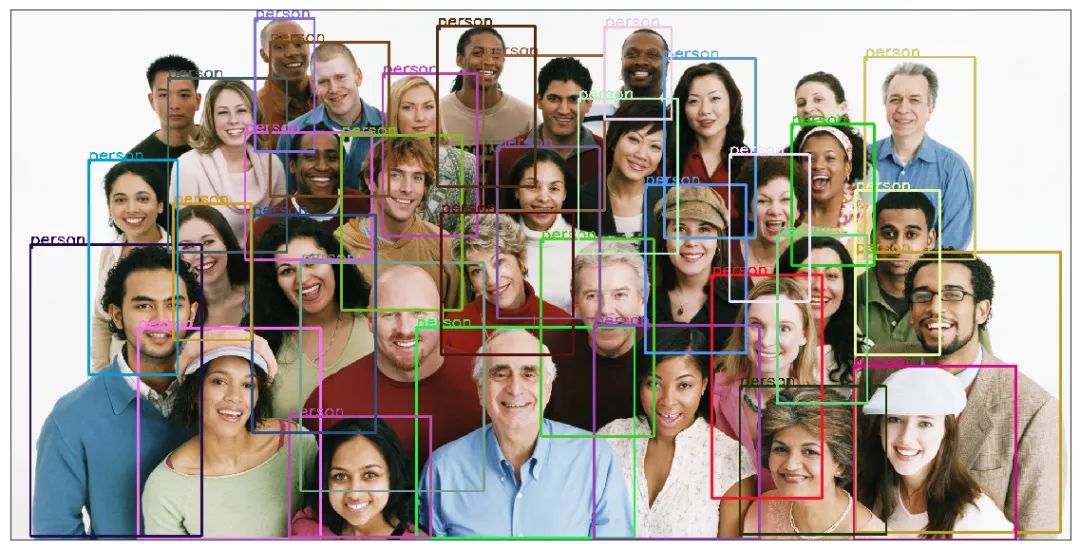
本期我们分享的是 Two-Stage 的代表作 Fater R-CNN ,这是属于 R-CNN 系列中比较经典的一个,目前比较流行。今天我们就带大家体验一把 Faster R-CNN 的检测,代码不多。
代码说明
我们代码使用的是 Pytorch 提供的目标检测模型 fasterrcnn_resnet50_fpn
model = torchvision.models.detection.fasterrcnn_resnet50_fpn(pretrained=True)
模型预测后得到的结果是
Bounding boxes [x0, y0, x1, y1] 边框的四个值
Labels 所有预测的标签
Scores 所有标签的分数
以下就是本次内容的所有代码:
import torchvision # 0.3.0 version 这里指的是所使用包的版本
from torchvision import transforms as T
import cv2 # 4.1.1 version
import matplotlib.pyplot as plt # 3.0.0 version
from PIL import Image # 5.3.0 version
import random
import os
import torch
device = torch.device("cuda" if torch.cuda.is_available() else "cpu")
model = torchvision.models.detection.fasterrcnn_resnet50_fpn(pretrained=True).to(device) # 加载模型
model.eval() # 设置成评估模式
# 定义 Pytorch 官方给的类别名称,有些是 'N/A' 是已经去掉的类别
COCO_INSTANCE_CATEGORY_NAMES = [
'__background__', 'person', 'bicycle', 'car', 'motorcycle', 'airplane', 'bus',
'train', 'truck', 'boat', 'traffic light', 'fire hydrant', 'N/A', 'stop sign',
'parking meter', 'bench', 'bird', 'cat', 'dog', 'horse', 'sheep', 'cow',
'elephant', 'bear', 'zebra', 'giraffe', 'N/A', 'backpack', 'umbrella', 'N/A', 'N/A',
'handbag', 'tie', 'suitcase', 'frisbee', 'skis', 'snowboard', 'sports ball',
'kite', 'baseball bat', 'baseball glove', 'skateboard', 'surfboard', 'tennis racket',
'bottle', 'N/A', 'wine glass', 'cup', 'fork', 'knife', 'spoon', 'bowl',
'banana', 'apple', 'sandwich', 'orange', 'broccoli', 'carrot', 'hot dog', 'pizza',
'donut', 'cake', 'chair', 'couch', 'potted plant', 'bed', 'N/A', 'dining table',
'N/A', 'N/A', 'toilet', 'N/A', 'tv', 'laptop', 'mouse', 'remote', 'keyboard', 'cell phone',
'microwave', 'oven', 'toaster', 'sink', 'refrigerator', 'N/A', 'book',
'clock', 'vase', 'scissors', 'teddy bear', 'hair drier', 'toothbrush'
]
# 获取单张图片的预测结果
def get_prediction(img_path, threshold):
img = Image.open(img_path) # Load the image 加载图片
transform = T.Compose([T.ToTensor()]) # Defing PyTorch Transform
img = transform(img) # Apply the transform to the image 转换成 torch 形式
pred = model([img.to(device)]) # Pass the image to the model 开始推理
pred_class = [COCO_INSTANCE_CATEGORY_NAMES[i] for i in list(pred[0]['labels'].cpu().numpy())] # Get the Prediction Score 获取预测的类别
pred_boxes = [[(i[0], i[1]), (i[2], i[3])] for i in list(pred[0]['boxes'].detach().cpu().numpy())] # Bounding boxes 获取各个类别的边框
pred_score = list(pred[0]['scores'].cpu().detach().numpy()) # 获取各个类别的分数
# Get list of index with score greater than threshold.
pred_t = [pred_score.index(x) for x in pred_score if x > threshold][-1] # 判断分数大于阈值对于的分数的最大索引
# 因为预测后的分数是从大到小排序的,只要找到大于阈值最后一个的索引值即可
pred_boxes = pred_boxes[:pred_t+1]
pred_class = pred_class[:pred_t+1]
return pred_boxes, pred_class
# 根据预测的结果绘制边框及类别
def object_detection_api(img_path, threshold=0.5, rect_th=3, text_size=3, text_th=3):
boxes, pred_cls = get_prediction(img_path, threshold) # Get predictions
img = cv2.imread(img_path) # Read image with cv2
img = cv2.cvtColor(img, cv2.COLOR_BGR2RGB) # Convert to RGB
result_dict = {} # 用来保存每个类别的名称及数量
for i in range(len(boxes)):
color = tuple(random.randint(0, 255) for i in range(3))
cv2.rectangle(img,
boxes[i][0],
boxes[i][1],
color=color,
thickness=rect_th) # Draw Rectangle with the coordinates
cv2.putText(img,
pred_cls[i],
boxes[i][0],
cv2.FONT_HERSHEY_SIMPLEX,
text_size,
color,
thickness=text_th) # Write the prediction class
# 将各个预测的结果保存到一个字典里
if pred_cls[i] not in result_dict:
result_dict[pred_cls[i]] = 1
else:
result_dict[pred_cls[i]] += 1
print(result_dict)
plt.figure(figsize=(20, 30)) # display the output image
plt.imshow(img)
plt.xticks([])
plt.yticks([])
plt.show()
if __name__ == "__main__":
object_detection_api('./people.jpg', threshold=0.5)
实验效果

我们分别在 FasterR-CNN 和 YOLO 下进行测试,测试结果如下:
都存在漏检的情况,这里我们只是简单的做个比较,等 Faster R-CNN 更新结束后,我们再统一来分析两者的差别


大家如果不想找测试图片的话,这里给大家提供几张
wget https://www.wsha.org/wp-content/uploads/banner-diverse-group-of-people-2.jpg -O people.jpg
wget https://hips.hearstapps.com/hmg-prod.s3.amazonaws.com/images/10best-cars-group-cropped-1542126037.jpg -O car.jpg
wget https://cdn.pixabay.com/photo/2013/07/05/01/08/traffic-143391_960_720.jpg -O traffic.jpg
wget https://images.unsplash.com/photo-1458169495136-854e4c39548a -O girl_cars.jpg
你可能还想看目标检测实战项目『体验篇』
YOLO 目标检测实战项目『原理篇』
目标检测实战项目『代码实战篇』

添加我为好友,一起交流吧
分享深度学习数据集、GPU 算力等资源

本文分享自微信公众号 - 算法猿的成长(AI_Developer)。
如有侵权,请联系 support@oschina.cn 删除。
本文参与“OSC源创计划”,欢迎正在阅读的你也加入,一起分享。
来源:oschina
链接:https://my.oschina.net/u/4580965/blog/4396839